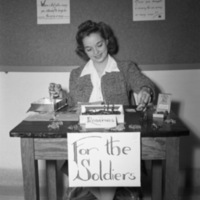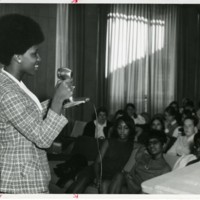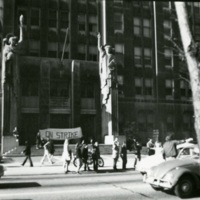Browse Exhibits (3 total)
The Legion of Young Polish Women

From its founding in 1939 to today, the Legion of Young Polish Women (Legion Młodych Polek) has remained an enduring non-profit organization within Chicago’s large Polish-American community. For over 75 years, the Legion has worked to support the people of Poland, Polish immigrants, and Polish-Americans through funding charitable organizations, supporting cultural events, and promoting Polish heritage.
This exhibit traces the history of the Legion of Young Polish Women from its founding at the beginning of the Second World War (WWII) to the present. The exhibit is divided into four sections; the first three sections are arranged thematically, exploring the Legion’s founding and early years (1939-1950), the organization’s activities and causes, and its iconic events. The final section of the exhibit explores how the Legion of Young Polish Women has continued to remain a vital part of Chicago’s Polish-American community and what it means to its members.
The exhibit was created utilizing materials from the Legion of Young Polish Women Records at the Women and Leadership Archives. Sources included newspapers, correspondence, photographs, administrative and financial documents, programs, and audio-visual material found in the collection. Additional contemporary interviews for this exhibit were conducted with members and supporters of the Legion of Young Polish Women and have since become part of the archival collection.
Activist Mundelein: Civic Engagement at a 20th Century Women's College




May 1970 witnessed a Mundelein College unlike any other. From students picketing down Sheridan Road to demands for better funding of Black student organizations, campus-wide debates to dorm room arguments, the Antiwar and Civil Rights Movements of the late 1960s exploded onto the Chicago campus.
Mundelein College, a Catholic all-women’s school in North Chicago, was no stranger to student activism. In the 1940s, co-eds baked pies for GI soldiers. In the 1950s, Young Republicans started campaigning. And in the 1960s, students revolutionized their curriculum to allow for more self-directed study. In many ways, civic engagement at Mundelein College mirrored the same student protest happening in universities across the United States. On the other hand, Mundeleinites expressed their social vision in ways undoubtedly shaped by their education at a women’s Catholic college.
This exhibit traces the history of student activism at Mundelein College from the 1940s through the early 1970s. In particular, the exhibit shows the ways in which students took part in the Antiwar and Civil Rights Movements, which eventually came to a head in May 1970. This exhibit Activist Mundelein explores the history of civic engagement through a collection of audiovisual materials, most significantly the Mundelein College Oral History Project. Other sources, including newspapers and photographs, strengthen the exhibit’s main arguments. The exhibit includes four sections: Activist Mundelein, 'We started in '68,' Antiwar Mundelein, and May 1970.
Mundelein College, founded in 1930 by the Sisters of Charity of the Blessed Virgin Mary (BVMs), affiliated with Loyola University Chicago in 1991, at which time it stood as the last all-women’s college in Illinois. Click here for a time line of Mundelein’s history.
Practical Work: Chicago Woman’s Club Reformers, Criminal Women, and Delinquent Children, 1876-1920

As a powerful organization of women committed to reform, education, and philanthropy, the Chicago Woman’s Club (CWC) played a critical role in late nineteenth and early twentieth century Chicago. The pages below explore how the Club emerged during a period of high hope and intense anxiety in Chicago. They then investigate the women of the CWC and how they went about the “practical work” of reform. In particular, this exhibit explores how and why clubwomen worked with criminal women and delinquent children. Ultimately, “Practical Work” considers the ways in which clubwomen shaped ideas about crime and proper womanhood at the turn of the twentieth century.

“Practical Work” draws heavily from the collection of CWC annual announcements and images at the Women and Leadership Archives at Loyola University Chicago, in addition to utilizing Club minutes housed at the Chicago History Museum.